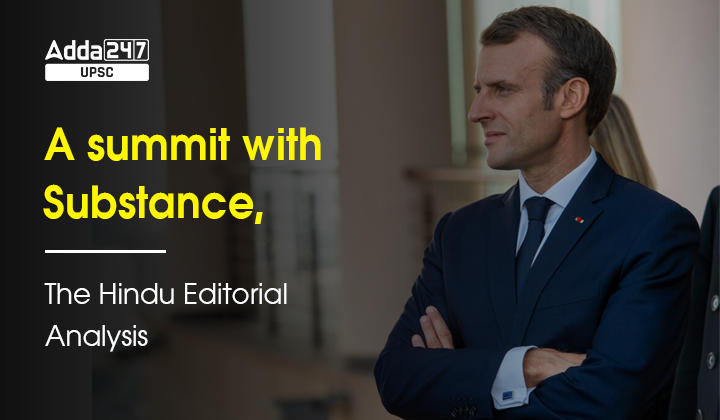Table of Contents
The Hindu Editorial Analysis: The Editorial Analysis of The Hindu Newspaper Editorial Articles aimed at simplifying various concepts relevant to the UPSC and other State PSC Exams. The Editorial Analysis helps in expanding the knowledge base as well as framing better quality mains answers. Today’s Hindu Editorial Analysis of ‘A Summit with Substance’ discusses about Summit for a New Global Financing Pact that is to be Co-chaired by India and France and aims to promote sound climate financing mechanism for the world.
Summit for a New Global Financing Pact in News
As global leaders and financial leaders gather in Paris for the Summit for a New Global Financing Pact, it is crucial to take concrete actions towards sustainable finance and avoid another international summit lacking substance.
- French President Emmanuel Macron aims to enhance “financial solidarity with the Global South,” with India, as the G20 president, co-chairing the summit’s steering committee, representing the voice of the Global South.
- The article emphasizes the gap between the promises made and the actual funding provided, particularly in the context of climate change and its impact on low- and middle-income countries.
Funding Gap in Achieving Objectives of Various Climate Initiatives
One Planet Lab’s white papers state that an additional $4 trillion per year is required to meet the Sustainable Development Goals, objectives of the Paris Agreement (COP21), and the Biodiversity COP15 at the global and national levels.
- However, only $204 billion of official development assistance was provided last year, highlighting the unpredictability and poor structure of international funding that fails to address the liquidity challenges faced by developing nations.
- Moreover, a mere 25% of global climate investment reaches vulnerable regions in South Asia, Latin America, and Africa.
- Global funds often impose conditions that limit fiscal independence, while domestic tax structures in developing countries contribute to institutional weaknesses and illicit financial flows, making it difficult to mobilize private investment due to perceived risks.
Suggestions for Summit for a New Global Financing Pact
The three key components that should be included in the summit’s agenda for a successful transformation of international financial and development architecture: pact, platform, and pathway.
Establish Govern Global Financial Flows
First, a pact should be established to govern global financial flows, encompassing domestic and international social contracts. At the domestic level, fiscal space in developing countries is limited by high debt.
- Enhancing this space requires modernizing tax structures, addressing illegal cross-border money movements, empowering tax administrations, and reducing ineffective fossil fuel subsidies.
- Additionally, proportional taxation of actors and goods involved in emission-intensive global flows should be considered.
- At the international level, finance is essential for adaptation, loss, and damage resulting from climate change.
- The international social contract should be based on global solidarity, and new resources can be mobilized by taxing fossil fuel production, shipping, and transportation.
- For example, a one-dollar tax on each barrel of oil could generate approximately $30 billion annually, decoupling financing for the vulnerable from political resistance in wealthy countries.
Global Platform to Mitigate Financial Risks
Second, a global platform should be created to mitigate financial risks and attract significant private investment in sustainable infrastructure.
- Blended finance is necessary for scaling renewables, adopting clean technologies for livelihoods, transitioning away from fossil fuels, and co-developing emerging clean technologies in vulnerable countries.
- Innovative mechanisms like a Global Clean Investment Risk Mitigation Mechanism can pool risks across regions and reduce costs for all.
- Attention should be given to hedging against currency fluctuation risks, which can increase the cost of finance. Transparency and real-time data are crucial in bridging psychological and financial gaps.
Political Pathways to Ensure Time Bound Climate Finance
Finally, a political pathway should be outlined, establishing time-bound deliverables on climate finance from one summit to another. While complete achievements cannot be expected in a single summit, the France summit can prevent further delays. It is essential to define the financial calculations, delivery mechanisms, and investment momentum for the next two years.
Conclusion
By the approaching 80th anniversary of the UN in 2025, reformed finance for sustainable development should serve as the foundation for renewed and meaningful multilateralism. Given that the bulk of global growth will originate from the Global South, it is crucial to cater to their needs and ensure their equitable representation at the table.
The Next Finance Commission will have a Tough Task, The Hindu Editorial Analysis
| Follow US |
| UPSC Govt Jobs UPSC Current Affairs UPSC Judiciary PCS Download Adda 247 App here to get the latest updates |



 TSPSC Group 1 Question Paper 2024, Downl...
TSPSC Group 1 Question Paper 2024, Downl...
 TSPSC Group 1 Answer key 2024 Out, Downl...
TSPSC Group 1 Answer key 2024 Out, Downl...
 UPSC Prelims 2024 Question Paper, Downlo...
UPSC Prelims 2024 Question Paper, Downlo...
